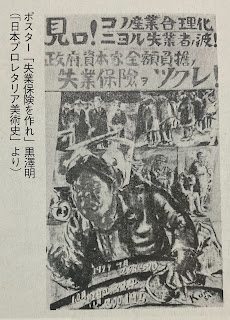Akira Kurosawa, "Meeting at the Construction Site" (watercolor), 1929, most likely displayed on the wall of the Institute of Proletarian Art
AKIRA KUROSAWA“Create Unemployment Insurance!”(poster)
両方現存しない
Both not extant.
現存していない
Not in existence.
ーー
美術研究所に架けられた黒澤明の300号。:落合学(落合道人 Ochiai-Dojin):SSブログプロレタリア美術研究所の壁に展示されていた可能性が高い1929年(昭和4)制作の黒澤明『建築現場に於ける集会』(水彩)
Akira Kurosawa, "Meeting at the Construction Site" (watercolor), 1929, most likely displayed on the wall of the Institute of Proletarian Art
Akira Kurosawa on his 'Marxist' roots:
"In my youth the situation of society was much worse than it is now. I experienced being a sort of Marxist. It was very fashionable among the youth. For one thing, we couldn’t get jobs after graduation from the university.
There was a fever among young people. They did not know how to use their energies. I would say that almost all the intellectual urban youth in that period were at one time or another Marxists. They were not satisfied with the government and its policies. I was one of them. In reflection, we were also enjoying the thrill of being Marxists.
But it is doubtful that I was a true Marxist, although I had that tendency. I still lean toward these ideas. I probably have Marxist ideas somewhere in me. When I was involved in the Marxist movement I fell ill.
I sort of dropped out as a young Marxist because of my health. I had to stay in bed for about one year. During that period literally all of my Marxist friends were arrested and dispersed. This occurred before I was twenty years old. I guess I was about eighteen.
I became sort of nostalgic for the time of my youth after I saw 'No Regrets for Our Youth' (1946) recently. I missed this period of my life while I was making that film.
Almost all the Japanese film directors who are my contemporaries were more or less Marxists and had similar experiences. The only two who remained Communists until now are Satsuo Yamamoto, who made War and Peace [Senso to Heiwa, 1947], and Imai Sho-chan. I guess these two are the only ones. The rest of us are all ex-Communists."
(Quote taken from 'Voice from the Japanese Cinema', Joan Mellen)
Clip from:
No Regrets for Our Youth (1946)
Director: Akira Kurosawa
黒澤明、彼の「マルクス主義者」のルーツについて:
「私の若い頃、社会の状況は今よりもずっと悪かったです。私は一種のマルクス主義者であることを経験しました。それは若者の間で非常に流行していました。一つには、大学を卒業しても就職できませんでした。
若者の間で熱が上がった。彼らは自分のエネルギーの使い方を知りませんでした。当時の都市部の知的若者のほぼ全員が、一度はマルクス主義者だったと私は思います。彼らは政府とその政策に満足していませんでした。私もその一人でした。振り返ってみると、私たちはマルクス主義者であることのスリルも楽しんでいたのです。
しかし、たとえそのような傾向があったとしても、私が真のマルクス主義者であったかどうかは疑わしい。私は今でもこれらの考えに傾いています。おそらく私の心のどこかにマルクス主義的な考えがあるのでしょう。マルクス主義運動に参加していたとき、私は病気になりました。
私は健康のため、若いマルクス主義者としてドロップアウトしたようなものでした。 1年くらい寝たきりでした。その期間中、文字通り私のマルクス主義者の友人は全員逮捕され、解散させられました。これは私が二十歳になる前の出来事でした。十八歳くらいだったと思います。
最近『青春に悔いなし』(1946年)を観て、なんだか青春時代を懐かしく感じました。この映画を作っている間、私は人生のこの時期を懐かしんでいました。
私と同時代の日本の映画監督はほぼ全員、多かれ少なかれマルクス主義者であり、同様の経験をしていました。現在まで共産主義者であり続けたのは、『戦争と平和』(1947年)を作った山本薩夫と今井翔ちゃんだけだ。この二人だけだと思います。私たちの残りは全員元共産主義者だ。」
(ジョーン・メレン「Voice from the Japanese Cinema」より引用)
クリップ元:
我が青春に悔いなし (1946)
監督:黒澤明
彼の兄はサイレント映画のための弁士だったが、ストライキ活動などで組織との板挟みになり自殺した。
His brother was an orator for silent films, but committed suicide when he was caught between the organization and strike action and other activities.
八島太郎展実行委員長の山田みほ子様Click!より、再び貴重な資料類をお送りいただいた。その中には、2010年にテレビ東京で放映されたドキュメンタリー『世界を変える100人の日本人』の八島太郎Click!編も含まれている。また、戦後の絵本関係の資料や作品画像、貴重な書簡類のコピー、八島太郎(岩松淳Click!)について書かれた椋鳩十による自筆の複写原稿もある。これらの資料については、またいつか改めて記事を書いてみたい。

 小野沢亘は、同研究所の事務所に住みこんで多様な雑事をこなすかたわら、川端画学校時代の実力をかわれてデッサンの講師もしていた。また、学生たちのデッサンにモデルを雇うときは、谷中にあった宮崎モデル紹介所Click!に出かけ、モデルの選定もしている。以前、こちらでご紹介したダット乗合自動車Click!のバスガールClick!に頼みこんで人物モデルClick!を依頼したのも、また小野沢亘の仕事ではなかっただろうか。小川薫様Click!のお母様・上原とし様Click!は、モデルを雇う資金がなくなったとき、ときどきモデルの依頼に乗務員組合を訪れる小野沢亘の顔を、よく知っていた可能性が高い。小野沢が書いた「研究所の留守番役」から、研究所での仕事の様子を引用してみよう。
小野沢亘は、同研究所の事務所に住みこんで多様な雑事をこなすかたわら、川端画学校時代の実力をかわれてデッサンの講師もしていた。また、学生たちのデッサンにモデルを雇うときは、谷中にあった宮崎モデル紹介所Click!に出かけ、モデルの選定もしている。以前、こちらでご紹介したダット乗合自動車Click!のバスガールClick!に頼みこんで人物モデルClick!を依頼したのも、また小野沢亘の仕事ではなかっただろうか。小川薫様Click!のお母様・上原とし様Click!は、モデルを雇う資金がなくなったとき、ときどきモデルの依頼に乗務員組合を訪れる小野沢亘の顔を、よく知っていた可能性が高い。小野沢が書いた「研究所の留守番役」から、研究所での仕事の様子を引用してみよう。
 同証言には、特高と憲兵隊とが仕事(思想・信条弾圧)の「成果」を競い合っていた様子も記録されている。登場する特高は、高田警察署Click!(現・目白警察署)に勤務していた刑事たちだ。プロレタリア美術研究所には、特高のほかにときどき憲兵たちも姿を見せていた。憲兵も内部資料を要求したようだが、特高の刑事から「憲兵に内部資料をわたす義務はない」との"助言"を受け、小野沢亘はうるさい憲兵たちを追い払いつづけた。
同証言には、特高と憲兵隊とが仕事(思想・信条弾圧)の「成果」を競い合っていた様子も記録されている。登場する特高は、高田警察署Click!(現・目白警察署)に勤務していた刑事たちだ。プロレタリア美術研究所には、特高のほかにときどき憲兵たちも姿を見せていた。憲兵も内部資料を要求したようだが、特高の刑事から「憲兵に内部資料をわたす義務はない」との"助言"を受け、小野沢亘はうるさい憲兵たちを追い払いつづけた。


 1932年(昭和7)12月に、プロレタリア美術研究所は東京プロレタリア美術学校と改称しているが、男子学生ばかりでなく八島太郎(岩松淳)夫人となる新井光子をはじめ、女子学生たちも次々と入学してくるようになる。その多くは、女子美術学校Click!在学中か卒業したての画家の卵たちなのだが、それはまた、別の物語……。
1932年(昭和7)12月に、プロレタリア美術研究所は東京プロレタリア美術学校と改称しているが、男子学生ばかりでなく八島太郎(岩松淳)夫人となる新井光子をはじめ、女子学生たちも次々と入学してくるようになる。その多くは、女子美術学校Click!在学中か卒業したての画家の卵たちなのだが、それはまた、別の物語……。



0 件のコメント:
コメントを投稿